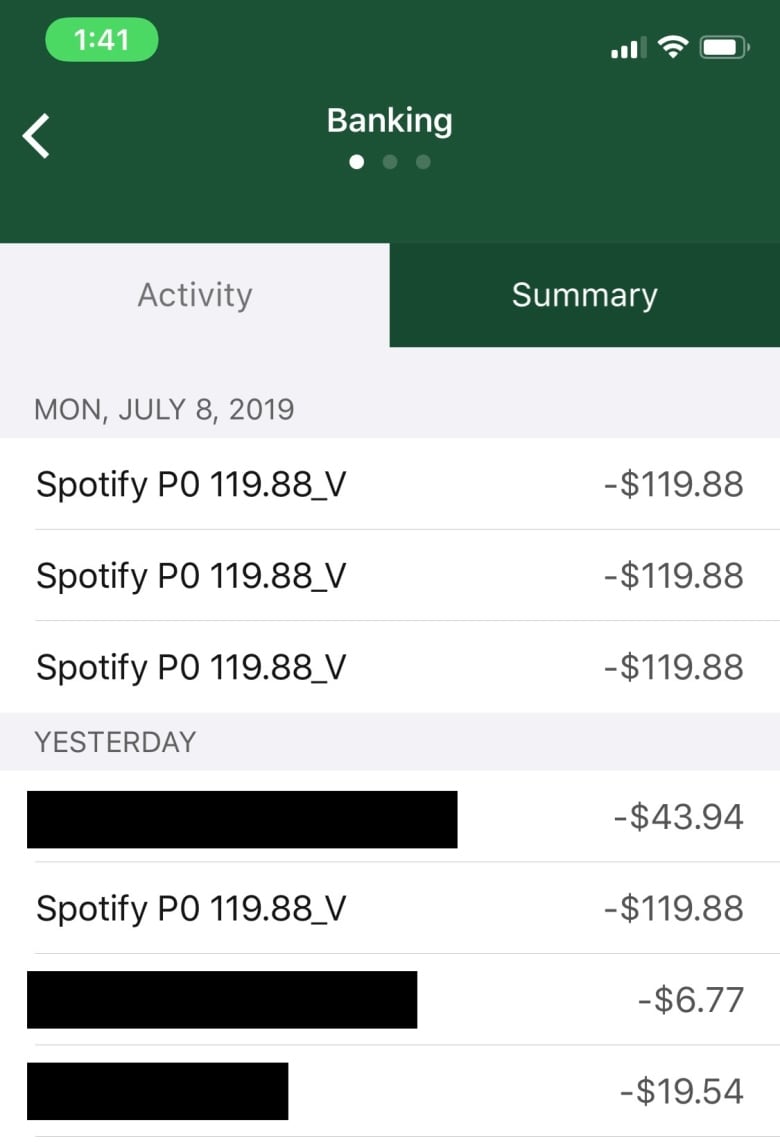
This article is more than
6 year old
Danielle Parent has never had a Spotify account, but on the weekend noticed four unauthorized withdrawals of $119.88 each for the music streaming service.
Parent, a graphic designer based in Toronto, is one of a number of Canadians who say they had money removed from their chequing accounts for the service to which they do not subscribe.
In total, Spotify charged Parent $479.52. It put her in overdraft and left her with no cash for groceries over the weekend.
"I kind of expect fraudulent charges to maybe happen on a credit card, but to have a direct charge on a chequing account was very shocking," she said.
Parent reported her concerns to her bank, TD, and the representative flagged the activity as fraudulent. She said she picked up a new debit card, and was told the bank was investigating and aware of similar problems involving other clients.
"If someone had access to my chequing account, wouldn't they drain my money, wouldn't they be making other purchases? Why just Spotify?"
In a statement to CBC News, a TD spokesperson said the company is looking into the issue with Spotify and Visa debit, and is working with its customers to reverse unauthorized charges.
The bank would not disclose how many customers are affected. It's unclear if customers from other banks are also having the same experiences.

CBC has contacted Spotify three times since Monday, but did not hear back from the company.
Brenda Hawboldt, who lives in Sydney, N.S., faced the same challenges this past weekend as Parent did.
Hawboldt was trying to buy a few things at a convenience store, but her debit card kept showing insufficient funds. She checked her account at home and saw three charges of $119.88 to Spotify, despite having never signed up for the service.
Her card, like Parent's, is a Visa Debit, meaning it can be used for online purchases and the funds will come out of her chequing account as they typically would with an Interac card. Both women say they have never used their debit cards online.
"I was so angry, I was shaking," Hawboldt said. "It's scary how easy it happened."
She said the only alert she got regarding her account was an insufficient funds message, a red flag that something went wrong.

Hawboldt also called TD and received a code for each transaction. The bank directed her to email Spotify that information. Her money was refunded midday Monday.
Someone at Spotify's customer service department emailed Hawboldt saying she wouldn't "have to worry about any unauthorized charges originating from that Spotify account.
"We were able to find the accounts (sic) that was using your payment details and have consequently blocked it," the email said.

Hawboldt said she wasn't satisfied with Spotify's response and still has questions about how her bank number was accessed.
"Nobody has explained it, even TD. I asked TD, 'How did this happen? What can I do to protect myself?' The only option they gave us was to go in and change our debit cards," Hawboldt said.
Parent was also in touch with numerous representatives from Spotify. One sent her an email with the same wording that Hawboldt received. The company does not offer customer service by telephone.
This isn't the first time people have raised concerns about the music streaming service.
In 2016, many Spotify users complained strangers were using their accounts or changing their login details. The company denied it had been hacked. It also denied being hacked in a 2015 incident when the information of more than 1,000 users was leaked online.
There are also similar accounts of unauthorized billing posted on Spotify's community forums by users who have questions about unauthorized withdrawals. Some of the posts date back years.
Read More (...)